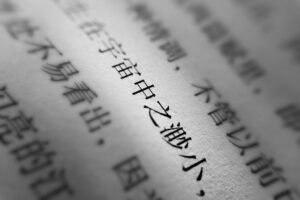Chinese is a fascinating language with complex grammatical norms and structures based on context. Prepositions are crucial in constructing meaning among the language’s many grammatical elements. Today, we will delve deep into one of the most frequently used prepositions: 在 (zài). This proposition is multifaceted, making it an indispensable part of the language.
Table of Contents
ToggleWhat does 在 (zài) mean?
在 (zài) primarily denotes the concept of “at” or “in” in English. It’s commonly used to indicate location or time.
Using 在 (zài) to Indicate Location:
- Physical Location: 在 can be used to tell where something or someone is.
- Example:
-
- 我在学校。(Wǒ zài xuéxiào.) – I am at school.
- Situation or Event: You can also use 在 to express someone’s participation in an activity or an event.
- Example:
-
- 他们在开会。(Tāmen zài kāihuì.) – They are having a meeting.
Using 在 (zài) to Indicate Time:
While less common, 在 can sometimes be used to express a point in time, especially in more literary contexts.
Example:
- 在那个夏天,我们去了海边。(Zài nàgè xiàtiān, wǒmen qùle hǎibiān.) – That summer, we went to the seaside.
Other Nuances and Uses:
Ongoing Action: 在 can be coupled with 正 (zhèng) or 正在 (zhèngzài) to emphasize an action that’s currently in progress.
Example:
他正在读书。(Tā zhèngzài dúshū.) – He is reading a book (right now).
In a Condition/State: 在 can also imply being in a particular condition or state.
Example:
我在想你。(Wǒ zài xiǎng nǐ.) – I am thinking of you.
Used with other prepositions: 在 is often found in combination with other prepositions or location words to provide specific details about the location.
Examples:
在桌子上 (zài zhuōzi shàng) – on the table
在房间里 (zài fángjiān lǐ) – in the room
Points to Remember:
Different from English: In Chinese, the verb “to be” isn’t necessary when using 在 to indicate location. So, the structure is simply: subject + 在 + location.
Position of 在: Unlike English prepositions, which come before nouns, 在 and its object often come before the verb.
Example:
我在公园看书。(Wǒ zài gōngyuán kànshū.) – I am reading a book in the park.
In conclusion, 在 (zài) is a versatile proposition that every Chinese learner should understand and practice thoroughly. The examples provided here are just the tip of the iceberg; the natural beauty and depth of 在’s application will become more apparent as you immerse yourself in it. Practice and real-life application will help in mastering the nuances and varied uses of 在. Happy learning!

FAQs: Chinese Preposition 在 (Zài)
Q1: Can I use 在 (zài) to indicate future events or locations?
A: Generally, 在 (zài) is used for current situations, especially when indicating location or ongoing actions. It’s more common to include a time specification in the sentence for future events.
Q2: Are there any common mistakes learners make when using 在 (zài)?
A: Yes! One common mistake is overusing 在 in places where it’s unnecessary, mainly when translating directly from English. For instance, “I like to read at home” doesn’t need 在; it would be “我喜欢在家读书” not “我喜欢在在家读书.”
Q3: Is 在 (zài) used in spoken and written Chinese?
A: Absolutely! 在 (zài) is a fundamental preposition in spoken and written Chinese. However, in literary contexts, its usage can sometimes be more nuanced.
Q4: How is 在 (zài) different from 里 (lǐ) when indicating location?
A: While both can indicate location, 在 (zài) is more of a general preposition for “at/in,” while 里 (lǐ) means explicitly “inside.” For example, “在房间 (zài fángjiān)” means “in the room,” whereas “房间里 (fángjiān lǐ)” emphasizes “inside the room.”
Q5: Can I use 在 (zài) to describe emotional states?
A: 在 can be used to describe certain emotional or mental states, as in “我在想你” (I’m thinking of you). However, not every emotional state will fit naturally with 在.
Q6: Can synonyms or other words replace 在 (zài) in specific contexts?
A: While 在 is a versatile and commonly used preposition, other words may be more suitable in some contexts. For instance, when specifying a location above something, you might use 上面 (shàngmiàn) instead of just 在.
Q7: How can I practice using 在 (zài) effectively?
A: Immersion and practice are essential. Engage in conversations, write sentences, or narrate stories using 在. Also, listening to native speakers through movies, songs, or conversations will give you a natural sense of its usage.
Q8: Is 在 (zài) used in idioms or famous sayings?
A: Yes, 在 is found in many idioms and sayings. For instance, “心不在焉 (xīn bù zài yān)” means to be distracted or not focused on the current situation.
Contact our head teacher, Chen Huimin, at info@lcchineseschool.com if you want to learn Chinese or have additional questions about our Chinese programs.
REGISTER for our SUMMER CAMP in 2023!
Learn about our Internship Program in China.
Learn about holidays in China in 2023.
Get free Chinese learning resources.







